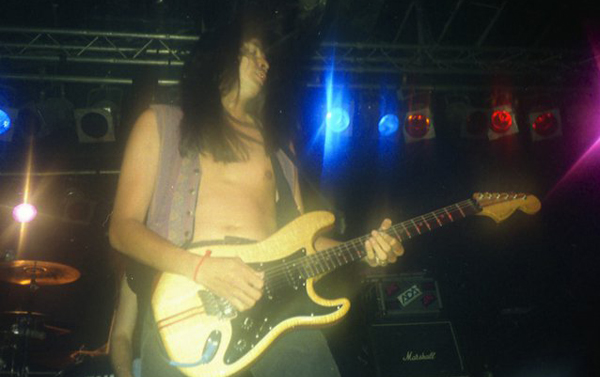I had to interview the rudest and most ill-prepared subject of my life. I can’t stand being in the room with this guy.
This was an absolutely embarrassment. Both parties should be ashamed of this. This was the worst interview of my life.
I had to interview the rudest and most ill-prepared subject of my life. I can’t stand being in the room with this guy.
This was an absolutely embarrassment. Both parties should be ashamed of this. This was the worst interview of my life.

A few weeks ago, I did a story about Victory’s new beer Dark Intrigue. Victory was kind enough to set me up with Jordan Sunseri, one of their brewers. I ended up having enough material to split the conversation into two separate stories. Drinking Made Easy just published the second part. Check it out…

Image Credit: Tim Snell
Sometimes this little blog creates fun opportunities for me (without me having to do a thing). This post just so happens to be one of those situations. Last week a writer named Gary Sutton came across my Amazon profile and then my website (to send me a note). We exchanged emails about his most recent book “Oskaloosa Moon”. Gary kindly agreed to answer a few questions after I finished reading it.
“Oskaloosa Moon” is the story about a young man with a facial deformity growing up in Iowa in the 50/60’s. His deformity instigates a few adventures and (of course) causes issues. Other readers have mentioned similarities to Forrest Gump and now that analogy is stuck in my head. While there are similarities, Sutton’s story does not sugarcoat the harsher aspects of our society—this book is not a fairy tale.
Before we get into the book, I thought your named seem familiar. There is a Gary Sutton that writes financial books—is that you?
I’ve written a few business books. The most recent was “Corporate Canaries” by Thomas Nelson and “The Six Month Fix
” by Wiley.
How did you get into writing?
Started liking the process in high school. Thought then that I wanted to write a book one day. Vietnam interrupted and then family. Took about three more decades before I had anything worth saying and it started with a series of business books. I felt I had enough literary license to the analogies that it seemed possible that I could write a novel. So I did.
Where did you get your inspiration for “Oskaloosa Moon”?
I think much of the book is what I experienced and what I saw. Some of it is what I imagined could have been. My junior high and high school girlfriends refuse to read it believing that it’s my story—it bothers them too much.
Did you have to do a lot of research to get the geography down?
No problem at all; this is where I grew up. I’ve been to every locale. But, I did have a lot of old friends scan the manuscripts for accuracy and added details…except those two girlfriends who couldn’t bear the story.
Moon is a complex character. While reading the book and trying to get into his head, I had a hard time deciding if he was an outright genius, a savant, or had a slight learning impairment. What is your official position?
With apologies, I don’t have one. He’s what you think he is.
Moon’s physical disability is a major plot point in the book—you waited a chapter to reveal that information to the readers, why did you hold off instead of giving the reader the information right away?
Telling all quickyly is journalism. Holding back is fiction. Journalism is information delivered efficiently. Fiction is entertainment unfolding.
The book gets pretty dark towards the end—why did you choose that direction?
There was an actual incident here in San Diego that inspired that. A deformed young man named Dale Akiki was wrongly imprisoned. The story reasonably tracks some of the things that happened to him.
One of the characters, Mr. Nordstrud, was written out of the book rather abruptly—was he always intended disappear or did you plan to revisit him at some point?
He’s a composite of some helpful adults along the way who nudged me away from trouble and pushed me towards better directions. No… I had no plans to revisit the character. Some of those good people disappear.
The main antagonist of the book (Dr. Throckmorton) plays like a classic comic book villain. Did he always exist as such a bastard or did you ever envision a more sympathetic (shades of gray) version of him at some point?
In fact you are so right, there was no evil guy in my small towns. But—the Superintendent and the Principle of Ames High did try to withhold my diploma.
As a writer, what is your opinion of eBooks? I read Oskaloosa Moon on a Kindle, and I am just curious what a published pro thinks of this new distribution model. Do you think it will be better for writers by cutting out the publishers (eventually)?
I view this as an inevitable business model, but feel bad about the gradual and steady loss of print and longer stories. I still don’t have a Kindle, iPad or NOOK but will soon, just to not be left behind. No, I don’t think it will be better by cutting out publishers. I’ve already had two novelas stolen and columns resold without permission, and so, the ease of digital theft will hurt the middlemen a lot but also the providers just as it did to music.
I want to thank Gary for this time and for writing a very engaging novel. Mr. Sutton is working on a few books at the moment: a revision on a non-fiction book for college seniors on how to snag that first paycheck and he is hoping to publish a new fictional novel in 2012.

NOTE: With the Phillyist going dark, the Gothamist network has given me permission to reprint some of my favorite posts.
Just a few short decades ago Philadelphia was a thriving east coast home for the 80’s metal scene. Reggie Wu, a founding member of the Philly metal scene, was a guitarist for a band named Heavens Edge. Reggie became “Philly-famous,” and was signed to a contract with Columbia records. He sat down with Phillyist to tell us his story.
When was Heavens Edge active and where did the name come from?
We started around 1987 and stayed together until 1992ish. One of the guys in the band—Mark (Evans) was in a band called Network but they had to change their name because another band was already using it. They held a fan contest to pick the new name and Heavens Edge was one of the options. They didn’t use it but he remembered it and then we used it. A lot of people think it was [a combination of] our names “Evans/Reg”!
What was the Philadelphia music scene like when you were playing?
It was hot—Philly was awesome! Cinderella and Britny Fox earned record deals, so Philadelphia was the national hot spot for a bit. Every show was a mob scene. WMMR was fully behind the band.
How did the band get their record contract?
We set up a showcase at the Troc and invited seven labels to see us. Our managers said we would be lucky if one showed up. Right before we went on, they said all seven were there. We had a great show and got verbal offers from every label. It was the night of dreams.
Did you have any crazy rock star moments?
For us there was really no rock star lifestyle. I was the only one in the band who had a child so on off days I would landscape to make extra money because the salary from the band was never enough. Kept you real humble. There was one perk—when you are broke and trying to make it, all music equipment is impossible to get—when you finally get a record deal, all the music equipment is given to you for free.
The 80’s metal/rock scene was very … white. What was it like being an Asian American guitarist in the metal scene and in Philadelphia during that period?
It really wasn’t a big deal. I was a big fan of both Loudness (Akira Takasaki) and Jake E Lee. I guess I never really thought of myself as different.
How did you get started with music?
My mom is a classical piano teacher. It was the rule that at four or five-years-old we learned classical piano and a second instrument a few years after that. My second instrument was the violin and I hated it. Eventually I got a guitar, which obviously I loved.
But your parents were against playing metal guitar as a career?
Coming from a Chinese family, it was all about being a doctor or lawyer (as my siblings and peers became). So when I told my parents I was going to pursue music they were against it—if I wasn’t doing it their way I had to leave. So moved out at sixteen.
What was it like being sixteen-years-old and on your own?
It was awesome. I was the only sixteen-year-old with an apartment, although I was totally poor. You just got use living that way. I cut lawns after school for money and jammed every spare second that I had.
I was very fortunate. There were a couple of key families that really helped me stay alive. To this day I am grateful for what they did for me and I am still very close to them.
Did you ever make up with your parents?
Yes. Unfortunately my younger brother passed away in a tragic accident when he was fifteen. I was nineteen at the time and it brought us all back together. I am super close with my parents to this day.
As grunge became popular, what happened to the band?
Our shows definitely became smaller—the attendance got much thinner. We were struggling financially and creatively. We tried to get a bit grungy but it just wasn’t us. Me, Dave and George started another band that was “grungier” but it didn’t go anywhere.
Mark started a cover band to make some income—things were bad then. I sold most of my guitars for groceries. I had the fifth seven string ever made; Steve Vai got the first four—I sold it for like $500, it is probably worth a ton more today.
How did you land on your feet?
My mom was a classical piano teacher—she always had me teaching when I was young. When the band broke up, I ran an ad in a local paper and got my first twenty students. I have been teaching ever since.
Is it hard to tell your students to focus in class with your rock and roll experiences?
I try to relay all the info that I can and give them as much good advice as possible. I relate well with my students. Nothing is more gratifying than seeing them succeed. It is all about helping the next generation get rockin!
Looking back, what are your overall thoughts on the Philly metal scene?
We all formed a really close-knit musical community. There are some really amazing musicians in this area. I am very proud to say I came from the Philly music scene!
( #ReggieWu, #Metal, #Philadelphia )
Phillyist published my interview with Philadelphia metal guitarist Reggie Wu.
Check it out: Phillyist Interviews…Reggie Wu